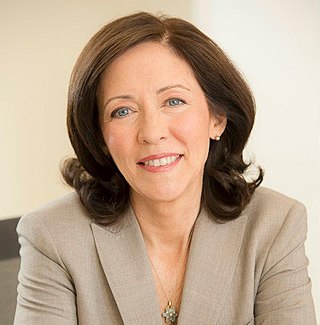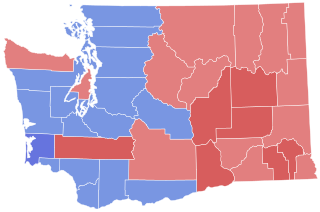
Maria Ellen Cantwell is an American politician who is the junior United States senator from Washington since 2001. A member of the Democratic Party, she served in the Washington House of Representatives from 1987 to 1993, and in the United States House of Representatives from 1993 to 1995.

Thomas Slade Gorton III was an American lawyer and politician from Washington. A member of the Republican Party, he served as a member of the United States Senate from 1981 to 1987, and again from 1989 to 2001. He held both of the state's U.S. Senate seats in his career and was narrowly defeated for reelection twice, first in 1986 by Brock Adams and again in 2000 by Maria Cantwell following a recount, becoming the last Republican senator to date for each seat.
Reagan's coattails refers to the influence of Ronald Reagan's popularity in elections other than his own, after the American political expression to "ride in on another's coattails". Chiefly, it refers to the "Reagan Revolution" accompanying his 1980 election to the U.S. presidency. This victory was accompanied by the change of twelve seats in the United States Senate from Democratic to Republican hands, producing a Republican majority in the Senate for the first time since 1954.

Brockman Adams was an American lawyer and politician. A Democrat from Washington, Adams served as a U.S. Representative, Senator, and United States Secretary of Transportation. He was forced to retire in January 1993 due to public and widespread sexual harassment, sexual assault and rape allegations.

The 1992 United States Senate elections, held November 3, 1992, were elections for the United States Senate. The 34 seats of Class 3 were contested in regular elections, along with special elections to fill vacancies. They coincided with Bill Clinton's victory in the presidential election. This was the first time since 1956 that the balance of the Senate remained the same.

The 1988 United States Senate elections were elections for the United States Senate. Held on November 8, 1988, the 33 seats of Class 1 were contested in regular elections. In spite of the Republican victory by George H. W. Bush in the presidential election, the Democrats gained a net of 1 seat in the Senate. 7 seats changed parties, with 4 incumbents being defeated. The Democratic majority in the Senate increased by one to 55–45.

The 1986 United States Senate elections were elections for the United States Senate. Held on November 4, in the middle of Ronald Reagan's second presidential term, the 34 seats of Class 3 were contested in regular elections. The Republicans had to defend an unusually large number of freshman Senate incumbents who had been elected on President Ronald Reagan's coattails in 1980. Democrats won a net of eight seats, defeating seven freshman incumbents, picking up two Republican-held open seats, and regaining control of the Senate for the first time since January 1981. This remains the most recent midterm election cycle in which the sitting president's party suffered net losses while still flipping a Senate seat.

The 1982 United States Senate elections were held on November 2, 1982. They were elections for the United States Senate following Republican gains in 1980. The 33 Senate seats of Class 1 were up for election in 1982. A total of four seats changed hands between parties, with Democrats winning seats in New Jersey and New Mexico, and Republicans taking seats in Nevada and the seat of the lone independent, Senator Harry Byrd Jr., in Virginia. Democrats made a net gain of one seat bringing them to 46 seats, while Republicans stayed at 54 seats for a majority. However, the Democratic gain in New Jersey replaced a Republican that had been appointed earlier in the year. Liberal Republicans senators in Connecticut, Rhode Island and Vermont held onto their seats, keeping the Senate in Republican hands.

The 1980 United States Senate elections were held on November 4, coinciding with Ronald Reagan's victory in the presidential election. The 34 Senate seats of Class 3 were contested in regular elections. Reagan's large margin of victory over incumbent Jimmy Carter gave a huge boost to Republican Senate candidates, allowing them to flip 12 Democratic seats and win control of the chamber for the first time since the end of the 83rd Congress in January 1955. This was the first time since 1966 that any party successfully defended all their own seats.

The 1976 United States Senate elections was an election for the United States Senate. Held on November 2, the 33 seats of Class 1 were contested in regular elections. They coincided with Democrat Jimmy Carter's presidential election and the United States Bicentennial celebration. Although almost half of the seats decided in this election changed parties, Carter's narrow victory did not provide coattails for the Democratic Party. Each party flipped seven Senate seats, although, one of the seats flipped by Democrats was previously held by a Conservative.

The 1962 United States Senate elections was an election for the United States Senate. Held on November 6, the 34 seats of Class 3 were contested in regular elections. Special elections were also held to fill vacancies. They occurred in the middle of President John F. Kennedy's term. His Democratic Party made a net gain of four seats from the Republicans, increasing their control of the Senate to 68–32. However, this was reduced to 67–33 between the election and the next Congress, as on November 18, 1962, Democrat Dennis Chávez, who was not up for election that year, died. He was replaced on November 30, 1962, by Republican appointee Edwin L. Mechem. Additionally, Democrat Strom Thurmond became a Republican in 1964, further reducing Democrats to 66–34. This was the first time since 1932 that Democrats gained seats in this class of Senators.

Rodney Dennis Chandler is an American politician and journalist who served five terms as a U.S. Representative from Washington from 1983 to 1993.

The 2000 United States Senate election in Washington was held on November 7, 2000. Incumbent Republican U.S. Senator Slade Gorton was seeking reelection to a third consecutive term, and a fourth overall, but he was unseated for a second time by a very narrow margin by former Congresswoman Maria Cantwell. The race was the most expensive contest in the state's history at the time.

The 1988 United States Senate election in Washington was held on November 8, 1988. Incumbent Republican U.S. Senator Daniel J. Evans decided to retire instead of running for re-election to a full term, after being appointed to the seat in 1983, and won election to a partial term that same year. Republican former U.S. Senator Slade Gorton, who had just lost a re-election bid in 1986, won the open seat. As of 2025, this is the last time Washington simultaneously voted for different parties for president and for senate, as Democrat Michael Dukakis won the state in the concurrent presidential election.

The 1994 United States Senate election in Washington was held November 8, 1994. Incumbent Senator Slade Gorton won re-election to a second consecutive term. As of 2025, this was the last time a Republican or a man won a U.S. Senate election in Washington.

The 1992 United States Senate election in Washington was held on November 3, 1992. Incumbent Democratic Senator Brock Adams chose not to run for re-election to a second term after eight different women made allegations that he had engaged in various acts of sexual misconduct, including harassment and rape. Adams denied the allegations, but his popularity statewide was weakened considerably by them, and he chose to retire rather than risk costing the party his seat.

The 1980 United States Senate election in Washington was held on November 4, 1980. Longtime incumbent Democratic U.S. Senator Warren Magnuson, the Senate President pro tempore, ran for a seventh term in office but lost re-election to Republican State Attorney General Slade Gorton. Magnuson was the most senior U.S. senator to lose re-election until Ted Stevens' defeat in 2008. Gorton was one of the dozen Republicans who beat Democrats to seize control of the Senate fueled by Ronald Reagan's landslide victory. This was the only time since 1926 that Republicans won Washington's Class 3 Senate seat and after losing re-election to this seat in 1986, Gorton later won Washington's other Senate seat in 1988 and 1994 before losing re-election again in 2000.

The 2018 United States Senate election in Washington took place on November 6, 2018, to elect a member of the United States Senate to represent the State of Washington. Incumbent Democrat Maria Cantwell won election to a fourth term over television news journalist Susan Hutchison, a Republican.

The 2018 Vermont Senate election took place as part of the biennial United States elections. Vermont voters elected State Senators in all 30 seats. State senators serve two-year terms in the Vermont Senate. A primary election on August 14, 2018, determined which candidates appeared on the November 6 general election ballot.

The 2022 Vermont Senate election took place on November 8, 2022, as part of the biennial United States elections. The election coincided with elections for other offices including the U.S. Senate, U.S. House, Governor, and State House. Vermont voters elected all 30 state senators from 16 districts, with each district electing between one and three senators. State senators serve two-year terms in the Vermont Senate. Primary elections were held on August 9, 2022. This election would be the first to use new districts adopted by the Vermont General Assembly to allocate for population changes across the state after the 2020 census.






















